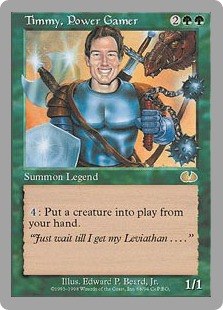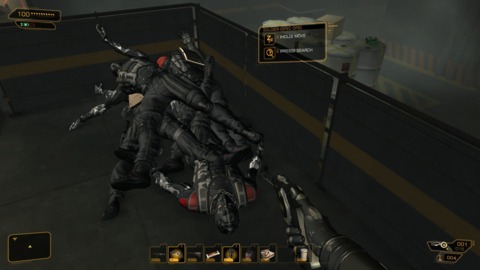Timmy, Johnny, and Spike
By majormitch 1 Comments

I used to play a lot of Magic: The Gathering, and while I don’t play that much anymore (I try to keep up with it to some degree) I still think it’s a fantastic game. During the height of my Magic fever I regularly read the design columns on Wizards of the Coast’s website, and one article in particular always fascinated me. Titled Timmy, Johnny, and Spike Revisited (itself a more comprehensive follow-up to the original Timmy, Johnny, and Spike article) and written by Mark Rosewater, one of Magic’s lead designers, this article goes into great detail about the three primary “psychographic profiles” used to identify what players want out of Magic. Mark expands more on the idea in the article (which I highly recommend reading in full), but the gist of it is that different players play Magic for different reasons. Needless to say, it’s extremely useful for a designer to know what those reasons are. These profiles define the basic motivations of Magic players, and knowing those motivations can go a long way in helping you to design a game that satisfies its players.
I talk about this on a video game website because I’ve always felt that different people play video games for drastically different reasons as well, a point that has only seemed more and more obvious over time as the medium has grown. That got me wondering how well Mark’s three psychographics profiles could be applied to video games. Is it reasonable apply the same three profiles to video game players? Are people motivated to play video games for the same reasons they might be motivated to play Magic? I thought it might be an interesting exercise to try and break down each profile in relation to video games and see what happens. I’ll go through each profile in turn, briefly describing the basics of each profile as well as how video games can satisfy them. Keep in mind that I won’t spend much time repeating Mark’s descriptions of each profile; please read his article for the detailed rundown (he explains it all much better than I could anyway). I’m going to try and focus more on how they specifically apply to video games.
Timmy
Mark has a short sentence to explain each profile’s basic motivation, and Timmy’s is simple: He wants to experience something. This is the profile that sees the inherent joy in the act of playing video games. Timmy plays to see cool moments, to hang out with friends, to feel the excitement of pressing buttons on a controller (or wave your hand through the air like a maniac if that’s your thing) and see it translated into actions on the screen. Timmy simply wants to have fun in whatever way he can. Timmy seems to make a smooth, easy transition to video games, as I hear people claim all the time that they play games for the sole purpose of relaxing, having fun and/or hanging out with friends.

Video games appeal to our inner Timmy in many ways, some more than others. Timmy enjoys the bombastic set pieces of an Uncharted or a Call of Duty, or the epic scope and scale of a God of War or an Elder Scrolls. These types of games appeal to Timmy’s visceral pleasure sensors; no explosion is too big for for the true Timmies of the world, and they will certainly never say no to gods or dragons. Timmy often enjoys playing the hero too, and will always be the first person to readily accept the quest to save kingdom or the world. Games like The Legend of Zelda and Final Fantasy directly service this motivation, and Timmy loves every moment of it. Timmy also really enjoys the social aspect of many games. He enjoys the camaraderie of a Gears of War or a Borderlands, and the intricate society of a World of Warcraft. Timmy can even be drawn to competitive games for similar reasons, so long as the focus of the group remains on having fun. Timmy pretty much always plays well with others.
Perhaps most importantly, Timmy loves the way it feels to play a video game. Timmy loves Super Mario because of the plumber’s smooth, responsive movement. Timmy loves Burnout because of the superb car handling (the sense of speed and extravagant crashes certainly help too). Timmy loves Call of Duty because of how good it makes it feel to shoot someone with a gun. Timmy has no interest in playing a game if the actual process of playing is frustrating or cumbersome. After all, he wants to experience something, and in video games the experience begins with picking up the controller and playing the game. If that part isn’t fun at the most basic level, Timmy wants nothing to do with it.
Johnny
Where Timmy wants to experience something, Johnny wants to express something. This is the profile that sees video games as a creative and expressive medium. This is perhaps a little more vague than Timmy’s motivation, but Johnny forms a connection with the games he plays; in a sense he sees his favorite games as extensions of himself. By playing those games Johnny is showing the world what he’s into and what he’s all about. I think Johnny’s motivations translate very well to video games, and has only become more applicable over the years. Video games have only become more diverse over time, providing more varied avenues for players to express themselves, and thus satiate their inner Johnny.

One of the most direct ways that a video game can appeal to Johnny is by allowing him to customize his play experience. Games with heavy RPG customization such as Elder Scrolls, Diablo and Deus Ex are all classic examples. These games focus on giving the player the ability to play however they want, thus letting Johnny express himself through his own playstyle. Johnny loves finding that build that best represents him, and he loves showing it off to the world. In fact, Johnny gets a special satisfaction from creating a build that nobody else thought of, or finding a way to do what others say can’t be done. Telling Johnny a skill or a weapon is bad is often a direct invitation for him to try it; succeeding with such a restriction shows how clever and inventive he really is. Competitive games such as Call of Duty or Street Fighter are among the best examples of this. No weapon or character is off limits to Johnny, and he derives a particular pleasure from proving that he can succeed by doing things his own way. Expressing those qualities is what Johnny lives for, and video games provide plenty of ways for him to do so.
Johnny also expresses himself through what video games he chooses to play. In some ways this may be his strongest form of self-expression, as Johnny will often identify strongly with the games he plays; they can be seen as extensions of himself. Johnny plays BioShock to express his love of engaging stories, he plays Shadow of the Colossus to express his appreciation for strong artistic direction, he plays Metroid to express his inner explorer. Conversely, Johnny generally refuses to play a game that doesn’t accurately express himself. For example, if he doesn’t like general fantasy settings, he won’t play fantasy games. Doing so would be a misrepresentation of himself to the world; Johnny plays video games as a form of self-expression as much as anything, and he’s not going to do so inaccurately.
Spike
Finally we come to Spike. Spike wants to prove something. This is the profile that sees video games as a challenge. Spike is drawn to video games because he wants to test his ability to overcome obstacles, and video games provide all sorts of measuring sticks to gauge performance. In fact, in many ways video games are built entirely around challenges. They can require a lot of dexterity and hand-eye coordination, demand you learn complex systems, and often let you compete against other equally determined players. Video games constantly evaluate the player, and Spike wouldn’t have it any other way. He’s out to prove what he can do, and video games are as good an arena as any for it.

The most obvious way that video games let Spike prove himself is through direct competition. Even the very first video games such as Pong were built around competition, and the idea remains as strong as ever. Games like Street Fighter, StarCraft and most shooters have fostered competitive atmospheres, spawning communities dedicated to achieving better play. Spike is the guy who counts frames in Street Fighter, or studies build orders obsessively in StarCraft. He’s also interested in the ever-evolving metagame, which is a key part of success in any competitive venue. For Spike, it’s all about being as good as you can, proving to either the world or yourself just how far you can go. This is by no means limited to multiplayer games though. Spike is just as eager to prove he has the dexterity to master games such as Ninja Gaiden or Super Meat Boy, or that he has the patience and mental fortitude to make it through a Souls game. No challenge is too tough for Spike to tackle. He wants to prove he can do it all.
Spike isn’t confined to only playing ridiculously hard games either. He has just as much to prove in games that aren’t considered difficult to beat. Spike loves to do number crunching and min/maxing in games like Elder Scrolls, or try and find new ways to break Metroid games in hopes of setting new speedrun records. Spike enjoys learning complex systems in games like Civilization, as he knows the key to success lies in understanding every little detail. Spike’s the guy who loves digging into the nuts and bolts of video games, and wants to dissect every mechanic and use that knowledge to make himself better; he’s all about fine tuning his game in whatever way he can. Spike’s always looking to improve his play, and video games are riddled with all sorts of challenges that let him prove that he’s up to the task.
Conclusion

I think Mark’s psychographics profiles of Timmy, Johnny and Spike are very applicable to video games. Their basic desires to experience, express and prove something are well satisfied within the medium, and more often than not a single game can appeal to all three sensibilities. There’s a reason I used games such as Call of Duty and Elder Scrolls as examples in multiple profiles. These are some of the most popular games out there, and I’d argue that they service Timmy, Johnny and Spike all at once, albeit in different ways and to varying degrees. Most successful games do, which I think shows that such profiling is very much a part of video game design.
Unless you’re a game designer, however, that doesn’t mean much for you. For our purposes I think it’s an interesting way to view different gamers and their motivations. We all certainly have at least a little bit of all three profiles in us, but I’d argue we all lean towards one or two more heavily. For my part, when Mark’s article had a working test that would determine your profile based on Magic card preferences, I came out as a Johnny/Spike (meaning I have a lot of both Johnny and Spike in me, but slightly more Johnny as it’s listed first). I think that’s very accurate, and represents a lot of my gaming tastes well. Can you see these three profiles in yourself, and if so does one or two of them stand out as being stronger than the others?
